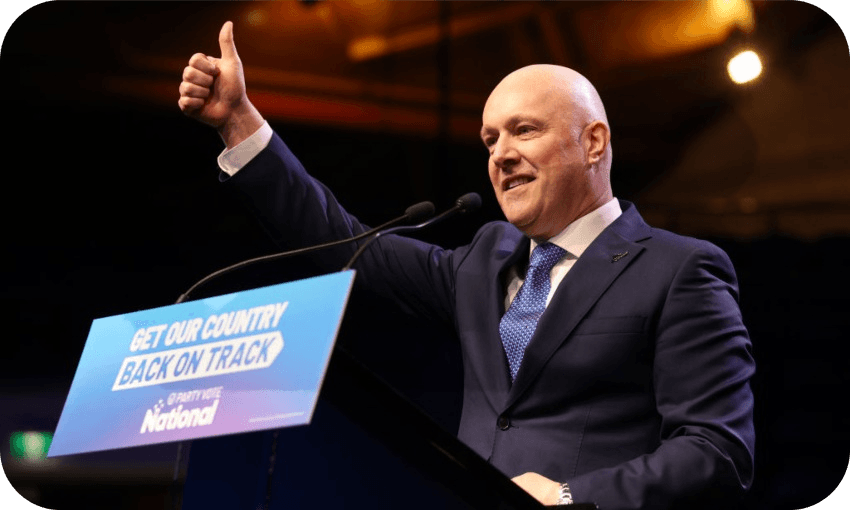Victory for National, but it remains unclear whether the ‘worst case scenario’ of bringing in New Zealand First is needed.
A change of government is imminent in New Zealand. Chris Hipkins this evening called Christopher Luxon to concede to the man who will soon assume the mantle of prime minister. The question that remains unanswered, and may prevail beyond election night, is whether Luxon requires NZ First as well as Act to form a government.
“You reached for hope and voted for change,” Luxon told supporters at a crowded Shed 10 function in Auckland. “It looks like National and Act will be in a position to form a government,” he said, while acknowledging Winston Peters’ pledge earlier in the evening to “help where needed”.
With 97.5% of the vote counted at midnight, National had just over 39% of the vote, higher than many polls had suggested but a drop from parts in the night when the party sat as high as 42%. On that number, National would have 50 MPs. Act, on 9% would have 11. That’s 61 out of a 121-seat party, with Te Pāti Māori’s four electorate seats on a 2.6% party vote creating that extra-seat overhang. A byelection on November 25 in Port Waikato would almost certainly add a seat to National’s caucus while creating a 122-seat chamber.
Labour is on 26.8%, which would translate to 34 seats. It represents a steep and disastrous collapse from the historic heights of the 2020 “Covid election”. Then, Jacinda Ardern was able to form the first single-party majority government since the introduction of the proportional MMP system in 1996, with 50.01% of the party vote, almost twice the 25.6% for National.
“When the tide comes in big, it almost invariably goes out big, too,” said Hipkins. “I gave it my all to turn the tide of history, but, alas, it was not enough.” He later said he had not yet made a decision about whether he would seek to remain as Labour leader in opposition.
New Zealand First is tracking to bring in eight seats with 6.5%. On 10.8%, the Greens would bring in a record 14 MPs.
At moments through the evening, Te Pāti Māori was leading in as many as six of the seven Māori seats. At the end of the night, there were four that looked to be theirs, with both co-leaders returning to parliament alongside Hana-Rawhiti Maipi-Clarke, the 21-year-old whose victory means the end of a long 26-year parliamentary career for Nanaia Mahuta. Just as remarkably, Rino Tirikatene appears to be out in Te Tai Tonga, to be replaced by Tākuta Ferris. Peeni Henare and Kelvin Davis lead by small margins in Tāmaki Makaurau and Te Tai Tokerau; were those to switch to TPM, the overhang would grow.
On current numbers, Labour would win just 17 of 72 electorate seats with a number of high-profile MPs facing ejection, including Michael Wood in Mt Roskill. Act has added a second electorate to David Seymour’s Epsom with Brooke van Velden taking Tāmaki following an audacious challenge that spells the end of the socially conservative National MP Simon O’Connor.
The Greens are celebrating turning one electorate seat into three, with Tamatha Paul winning a three-way race in Wellington Central. Julie Anne Genter leads by 745 votes in Rongotai while Chlöe Swarbrick retains Auckland Central.
The final opinion polls had suggested the gap was closing, with National averaging around 35%, Labour 28%, the Greens 13%, Act 9%, NZ First 7% and Te Pāti Māori 2.7%.
Earlier today, concerns were raised about queues at polling booths after the Electoral Commission’s online roll repeatedly crashed. The issue was resolved early afternoon, however. “The app is used to look up people who don’t have their EasyVote card or don’t know which electorate they are in,” said an Electoral Commission spokesperson. “The issue has had no impact on most people’s voting experience but caused some delays for people casting a special vote at some of our busiest voting places.”
As for the final composition of parliament, special votes, which at the last two election accounted for 17% of the total vote, could be critical. The question, as it so often does, relates to the Rt Hon Winston Peters. Nineteen days ago, the National Party issued a video offering clarity on a question Luxon had refused to entertain through the year. “If New Zealand First is returned to parliament, and I need to pick up the phone to Mr Peters to keep Labour and the Coalition of Chaos out,” said the National leader, “I will make that call.” For the time being, Peters should keep his phone charged.
Follow Gone By Lunchtime on Apple Podcasts, Spotify or wherever you listen to podcasts.





